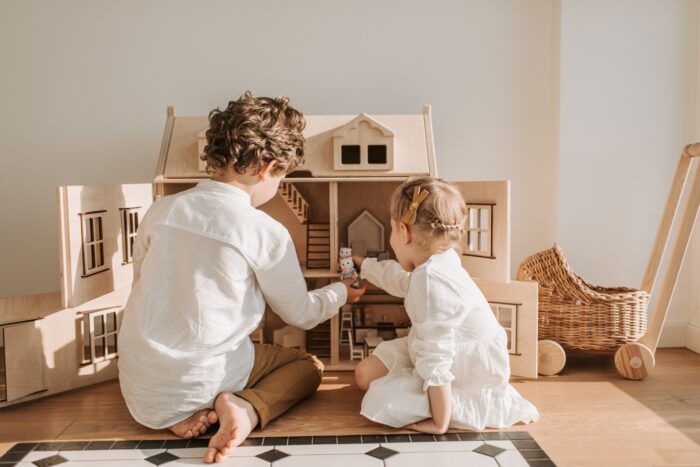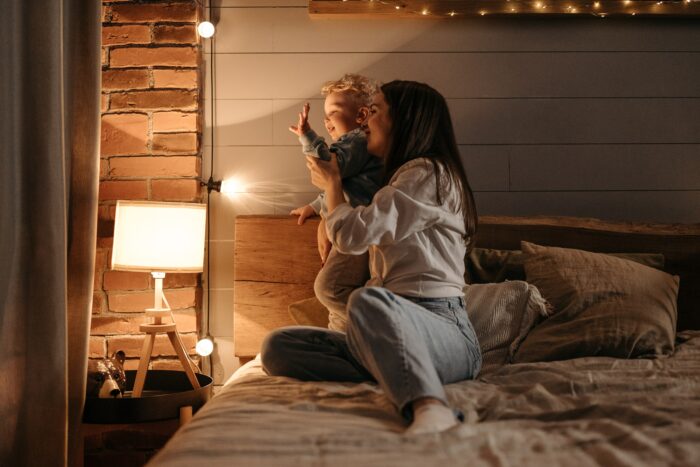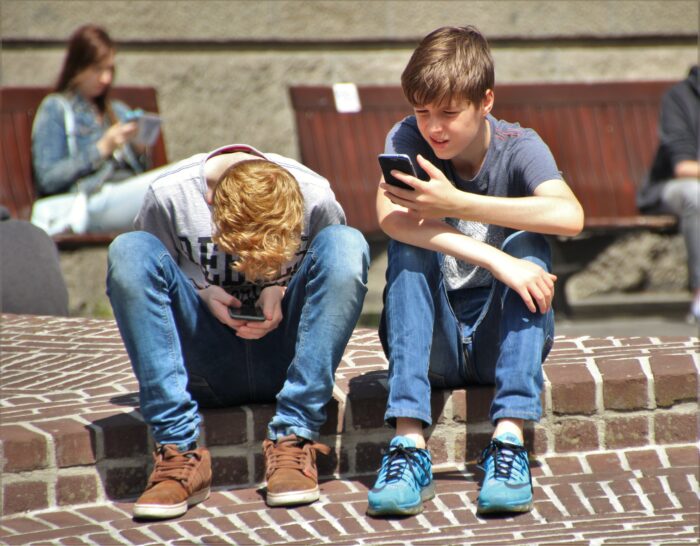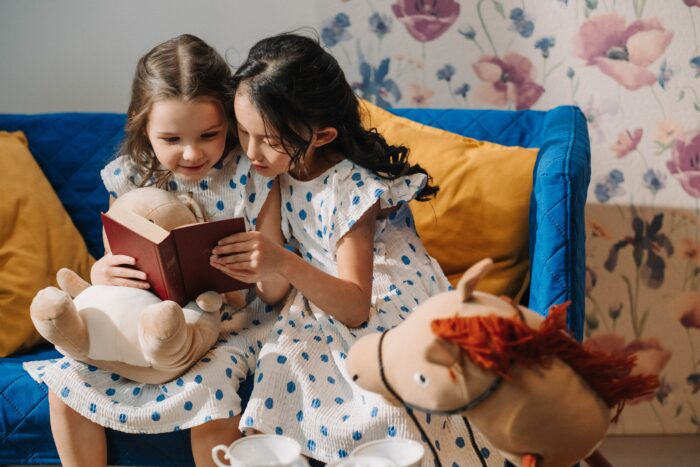
When my kids were little, I’d ask them questions like “Do you want crackers or pretzels for a snack?” and “Do you want to wear the blue shirt or the red shirt?”
It made them feel independent and grown up to make their own decisions, but at the same time it didn’t overwhelm them with a myriad of choices. I learned early on that I could avoid many meltdowns if I just offered only two options.
Their little minds were easily overwhelmed and therefore incapable of deciding between so many choices, or of making decisions that were too important.
Now that my children are well out of the tantrum phase, I’ll ask for their opinion but still give them a heads up that I’ll be making the final decision. They know their opinions matter, but they also know that they aren’t the ones who get the final say.
The truth is, it’s a burden to a child to have to decide adult things. Even if it feels like they want to, they’re inwardly relieved that there is a grown-up at the wheel. They may grumble and groan outwardly, yes, but deep down they want you to take the reins on the tough decisions.
This means two things for us as parents:
- Someone else has to be the grown-up.
- That someone is you.
I’ll admit that sometimes in a dark and anxious moment, I just want to vomit all my fears and concerns onto my poor, unsuspecting kiddos. But that wouldn’t be fair, or kind.
I understand that as children grow, the seesaw begins to even, and I can (and have) let them carry more and more weight. This should be tempered with a respect for what they can handle, though. There is such a sweet relief in knowing, “There is a grown-up around here, and it is not me.”
Grown-ups make hard decisions. That comes with the territory. And grown-ups carry difficult knowledge and concerns that kids should not have to carry.
Living simply for the sake of our children’s health has become all the rage lately. We would also do well as parents to simplify our kids’ lives by filtering out the adult world.
Too much information about adult concerns does not prepare a child for a complicated world; it just paralyzes him.
Being “That” Parent
In the last 20 years, there has been a massive transfer of authority from parents to kids. And our parenting in general is getting worse instead of better, despite all the time and money we’re spending on it.
Ultimately, catering to kids’ preferences has been profoundly harmful to children.
Contrary to popular belief or trend, kids expect us to protect them. Of course, they may not always agree with every rule and boundary. And that’s because they don’t know what they don’t know.

As a parent, you have to decide ahead of time what your non-negotiable will be when it comes to your kids.
There are a million important things in life, absolutely.
Being kind to others? Yes. Being a good friend? Certainly. Serving the community? Yup. Others’ feelings? Sure.
But our kids’ health and well-being is the ace. The trump card, if you will.
Placing our children in situations they cannot handle in the name of being kind to others is actually not very kind at all.
You would never, ever armor up your seven-year-old and place him on the front lines of a military battle. It would be cruel and uncaring.
Yet there are many current situations that our children’s hearts and minds are just too small and too unready to face.
Whatever hard decision that needs to be made in order to minimize or delay these situations is completely worth it. Not allowing sleepovers. Taking away the smartphone. Placing limits on time spent with a certain “friend”.
Temporary hurt feelings are a small price to pay compared to long-term, adult-size problems.
Your main responsibility as a parent is to protect your children from the weight of carrying things they were never meant to shoulder.
It’s true we can’t shield our kids from all of the pain and hurt in this world, but we can filter out what they’re not able to process yet. We can tell them those things they’re ready to handle when they’re ready to handle them, and not a moment before.
Dealing With The Tech-Saturated World
As parents of the 21st Century, we’re navigating things our parents never had to deal with. We are facing a full-on public health crisis of the digital age, and it’s not pretty.
We’ve taken a generation of kids during their most socially vulnerable years (when they’re looking for validation) and we’ve handed them an impossible place to find it- the internet. We’ve granted them virtually limitless access to the entire world, which includes every creep and predator out there.
Through their phones and iPads, they have full access to pornography, bullying, and endless opportunities to be peer-pressured into making regrettable, lasting decisions.

So what’s the cure for a tech-saturated world? Do we just throw all of our devices into the ocean?
I don’t think we need to get that extreme. Of course, limiting how much our kids are exposed to online and delaying the age when they receive a coveted smart phone are very good (and reasonable) options.
But having them invest time in spaces where they can get back to the simple joys of being a child is great, too.
As much as possible, have your children spend time in the following spaces based on how they’re uniquely wired:
Outside Spaces
Helping your kids think and act more calmly really is as easy as providing them with a chance to be out among nature. Give your child a seed from your apple and ask her to plan it. Suggest the kids build a fort under that overgrown bush out back. Mark six different colors on a paper bag, and have your children find one of each color object.
Reading Spaces
Creating spaces that champion reading not only promotes literacy, but builds your children’s capacity for empathy, self-control, and understanding cause and effect. Gather a pile of pillows and set them in front of a sunny spot by the window, next to a basket full of good books that feed their mind and soul. Lay a blanket on the lawn, set out some snacks, and read to a chapter aloud to your kids.
Spaces for Honing Responsibility
Maybe your kids are too young for legal employment, but it’s never too early to help them understand the joy and responsibility of doing a job well and managing money. All children, from toddlerhood on, can take part in basic household chores that contribute to the family’s well-being.
Maybe your kids can even come up with their own business plan, offering additional chores to earn some cash. Encourage them to brainstorm ideas to improve the household: organizing the bookshelf, sweeping the porch, fluffing the pillows, putting away the laundry.
Socializing Spaces
Our children need real conversations in real life with real people. Conversations that include (gasp!) lulls and plenty of awkwardness.
Create opportunities for your kids to have friends over, meet at the park, ride bikes around the neighborhood or to the dirt lot. Plan a playdate for your daughter and teach her and a friend the art of making lanyard bracelets. Invite your son’s friend over to play soccer or legos.

Corporations, the media, and politicians do not truly care about your kids. They don’t. They’re interested in pushing an agenda or selling a product. So many adults today unfortunately use children as a way of justifying their own actions and desires.
But you’re the one who is with your child day in and day out. You’re the one that has a vested interest in their emotional and spiritual well-being.
And you (and your children) will have to deal with the fallout of bad ideologies and things they can never unsee or unhear.
You hold the hope of the future in your arms. You’re doing the good work when you guard against all the stuff that wants to infiltrate their precious minds and hearts.
You are giving your kids a fighting chance at a childhood filled with games, toys, and carefree days, and not anxiety, confusion, or the shame that comes with an adult-sized addiction.
Be the parent. Carry the heavy load and leave them with a smaller, much more manageable one.
For the moment, give them the gift of not being a grown-up. Your kids will thank you later.

Leave a Reply
You must be logged in to post a comment.